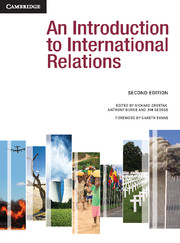Book contents
- Frontmatter
- Contents
- Tables, Figures and Boxes
- Contributors
- Preface and acknowledgements
- An Introduction to International Relations: The origins and changing agendas of a discipline
- 1 Theories of International Relations
- 2 The Traditional Agenda
- 3 The New Agenda
- 21 The United Nations
- 22 Non-State Actors: Multinational Corporations and International Non-Governmental Organisations
- 23 Religion and Secularism
- 24 Global Economic Institutions
- 25 Global Trade
- 26 Global Finance
- 27 Global Poverty, Inequality and Development
- 28 Globalisation and Its Critics
- 29 Global Terrorism
- 30 Post-Conflict State-Building
- 31 Humanitarian Intervention
- 32 Human Rights
- 33 Migration and Refugees
- 34 Global Environmental Politics
- 35 Climate Change
- Glossary of Terms
- Bibliography
- Index
- References
27 - Global Poverty, Inequality and Development
from 3 - The New Agenda
- Frontmatter
- Contents
- Tables, Figures and Boxes
- Contributors
- Preface and acknowledgements
- An Introduction to International Relations: The origins and changing agendas of a discipline
- 1 Theories of International Relations
- 2 The Traditional Agenda
- 3 The New Agenda
- 21 The United Nations
- 22 Non-State Actors: Multinational Corporations and International Non-Governmental Organisations
- 23 Religion and Secularism
- 24 Global Economic Institutions
- 25 Global Trade
- 26 Global Finance
- 27 Global Poverty, Inequality and Development
- 28 Globalisation and Its Critics
- 29 Global Terrorism
- 30 Post-Conflict State-Building
- 31 Humanitarian Intervention
- 32 Human Rights
- 33 Migration and Refugees
- 34 Global Environmental Politics
- 35 Climate Change
- Glossary of Terms
- Bibliography
- Index
- References
Summary
Introduction
This chapter examines poverty and inequality in global politics. The first section provides the background for our analysis of global poverty and inequality. We demonstrate the importance of beginning with an appreciation that poverty and inequality are complex, and that how they are understood and theorised in development is contested (McMichael 2010). We illustrate that any meaningful discussion of poverty and inequality necessarily has to be in relation to development. This is partly because understandings of poverty and inequality are already deeply informed by a preconceived idea of what development is and how it should be achieved. The second section discusses key contemporary initiatives for global development. The final section focuses on the United Nations’ (UN) Millennium Development Goals (MDGs) initiative. Through an analysis of the MDGs we reconnect to the key points put forward in the first section of this chapter.
Background to understanding poverty and inequality
Global poverty and inequality have been high on the agenda in world politics since the start of the new millennium. This is not surprising, as not only is the worldwide gap between the rich and the poor growing, but there has also been an unprecedented rise in insecurities and vulnerability in the everyday lived experiences of many people, specifically the poor. There is no shortage of figures and statistical evidence to draw upon in order to substantiate these claims (see, for example, the World Bank’s World development reports since 1990 and the United Nations’ Human development reports). Two highly visible issues can be drawn upon to illustrate the growth of inequality and poverty in global development. These are the growth of slum-dweller and/or squatter communities globally, and the rise of food insecurities for many, also globally. For example, Mike Davis’s recent work, presented in his book Planet of slums, on the rise and expansion of slums across the globe, has drawn attention to the rapid increases in precarious living conditions in urban and peri-urban areas (Davis 2006). The expansion of slum dwellings occurs in direct relation with development processes, including industralisation and urbanisation. In the case of food insecurities, the rise in the incidence of food riots globally since the 1980s has also been taking place in the midst of high technology-oriented, high mass-scale production of food for the global market (Patel 2008). Activists, non-governmental organisations (NGOs), policy-makers, politicians and scholars are all engaged in rigorous debates about the scale and character of global poverty and inequality, and have embarked on various campaigns to ‘make poverty history’. However, first and foremost, it is important to carefully reflect on the history of poverty and inequality; any meaningful discussion of these two issues is incomplete without addressing their corollary: namely development, or the lack thereof (see Box 27.1).
- Type
- Chapter
- Information
- An Introduction to International Relations , pp. 372 - 385Publisher: Cambridge University PressPrint publication year: 2011
References
- 1
- Cited by



